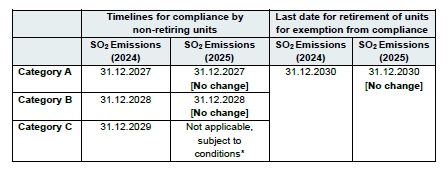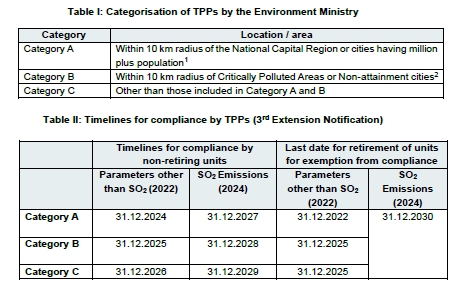- within Environment topic(s)
- within Environment, Family and Matrimonial, Litigation and Mediation & Arbitration topic(s)
- with Inhouse Counsel
- with readers working within the Technology, Utilities and Law Firm industries
1. INTRODUCTION
1.1 The Ministry of Environment, Forest & Climate Change, Government of India ("the Environment Ministry") through its Notification dated 11th July 2025 ("FGD Exemption Notification") has exempted certain Thermal Power Plants ("TPPs") from installing Flue Gas De-sulfurization ("FGD") systems, which are designed to cut SO2 emissions. There is no change in the Environmental Compensation levied on per unit generated beyond the dates specified. The dates in comparison to the pervious deadline is as follows:

* Subject to ensuring certain compliance. Please refer to Table III hereinbelow.
2. BACKGROUND
2. 1 The Environment Ministry introduced stringent emission standards for TPPs through its ation_Dec_2015.pdf Notification dated 7th December 2015 ("2015 Notification"). These revised norms established permissible thresholds for the emission of particulate matter ("PM"), sulphur dioxide ("SO₂"), oxides of nitrogen ("NOx") and mercury, thereby mandating a significant overhaul of emission control mechanisms for the TPPs. The stipulated standards were differentiated based on the year of commissioning of each TPP, thereby applying a graded compliance framework. The year of commissioning were as follows:
- TPPs installed before 31.12.2003;
- TPPs installed after 01.01.2004 upto 31.12.20216; and
- TPPs installed after 01.01.2017.
According to the 2015 Notification, all existing TPPs were required to achieve full compliance within two years from the date of publication of the 2015 Notification i.e., by 6th December 2017, however the same was later extended by various Notifications as mentioned below. In order to adhere with the parameters introduced by 2015 Notification, TPPs were expected to undertake substantial capital investments in the installation of advanced emission reduction technologies, such as the electrostatic precipitator for meeting PM emission norms, FGD systems for SO2 emission norms and combustion modification for NOx emission norms.
2.2 Subsequently, through a Notification dated 28th June 2018, the Environment Ministry introduced further revisions to the Environment (Protection) Rules, 1986 ("Rules") through the Environment (Protection) Amendment Rules, 2018. The Environment Ministry, again, through its Notification dated 31st March 2021 ("1st Extension Notification") categorised all the TPPs in three categories (i.e. Category A, B and C as provided hereinbelow at Table I) specifying timelines for compliance up to December 2022, December 2023 and December 2024 for Category A, B, and C respectively for SO2 emissions and other than SO2 emissions (PM, NOx, Hg). It also included provision for penalty i.e. Environmental Compensation on the non-compliant units.
Thereafter vide Notification dated 5th September 2022 ("2nd Extension Notification"), the Environment Ministry further extended the compliance timelines only for SO2 emissions up to December 2024, December 2025 and December 2026 for Category A, B, and C TPPs respectively. It also enhanced the Environment Compensation for non-compliant units of TPPs. Thereafter, the Environment Ministry through Notification dated 30th December 2024 ("3rd Extension Notification") further extended the compliance timelines for SO2 emission up to December 2027, December 2028 and December 2029 for Category A, B and C TPPs respectively.

3. ENVIRONMENT MINISTRY'S NOTIFICATION DATED 11TH JULY 2025
3.1 In the latest amendment to the Rules, the Environment Ministry through the FGD Exemption Notification has exempted certain TPPs from installing FGD systems. There is no change in the Environmental Compensation levied on per unit generated beyond the dates specified.
To view the full article please click here.
The content of this article is intended to provide a general guide to the subject matter. Specialist advice should be sought about your specific circumstances.


